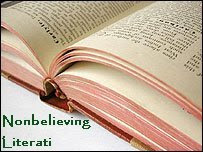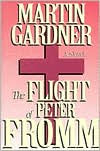NL: The Flight of Peter Fromm
 This time we read The Flight of Peter Fromm by Martin Gardner. His only novel, it's a semi-autobiographical accounting of a fundamentalist's journey towards ... well, that would be telling (though if you know Gardner's spiritual status, you know).
This time we read The Flight of Peter Fromm by Martin Gardner. His only novel, it's a semi-autobiographical accounting of a fundamentalist's journey towards ... well, that would be telling (though if you know Gardner's spiritual status, you know).The novel follows that conceit of being "true" - supposedly Gardner is editing for publication a factual account of what happened to Peter Fromm, an account written by Fromm's recently deceased mentor, a professor named Homer Wilson. (Names are rather important in this book - in fact, Wilson spends a page or so talking about the significance of "Peter" and "Fromm" - and Homer is appropriate for the narrator of such an epic journey.)
Peter Fromm is a divinity student at the University of Chicago, beginning in the late 1930s and graduating in 1948 - WWII intervened in
 his studies as it did in so many people's. He comes to Chicago because it's the most liberal divinity school he can think of... Peter is a real Fundamentalist, a child preacher and genuine Saved in the Blood Protestant. His ambition is to kindle a new Reformation, a Revival of the entire country, and he intends to start by confounding the liberals in the Gray City (as the University was called at the time). Wilson is at the opposite end of the spectrum, an atheist Unitarian pastor. He sees in Peter something he doesn't see in many of his young students - an active mind - and decides to take him in hand and nudge him towards the truth. What happens is not what either of them expects.
his studies as it did in so many people's. He comes to Chicago because it's the most liberal divinity school he can think of... Peter is a real Fundamentalist, a child preacher and genuine Saved in the Blood Protestant. His ambition is to kindle a new Reformation, a Revival of the entire country, and he intends to start by confounding the liberals in the Gray City (as the University was called at the time). Wilson is at the opposite end of the spectrum, an atheist Unitarian pastor. He sees in Peter something he doesn't see in many of his young students - an active mind - and decides to take him in hand and nudge him towards the truth. What happens is not what either of them expects.This book is full of theology. Wilson tells us that Peter's journey mirrors the church's, from primitive to the more refined, and the book spends a lot of time covering that theology, from Nestor to Barth, Niebuhr, and Kierkegaard. Wilson of course disagrees with all of it, but Peter begins by accepting and then moving past each Christology in turn. It's not easy on him - from the beginning of the book we know that he has a meltdown preaching on Easter Sunday, 1948 - but Wilson hopes it will make him a "loyal liar", someone able to steer American Protestantism towards the truth. But his truth and Peter's are never the same, and that's what this book is, ultimately, about.
I said that Wilson wants to make Peter a "loyal liar." He himself is a "truthful traitor" - one who cannot play the game inside Protestantism any longer. This is just one of the dichotomies that runs through this book - what Wilson calls the bright-edge dichotomies, the either-ors that attract Peter, who has no time for the gray areas of compromise. Paul's statement in 1 Corinthians - "if Christ be not risen, then is our preaching vain, and your faith is also vain" - and the question of the empty tomb run through the entire book: who is Jesus, and what is he, and how do we conceive of him? Is he human, god, some hybrid, a man adopted or possessed by the divine, or even just a myth with no real basis in history at all? Can we be Christians in any meaningful sense if we can't answer that question, or if our answer isn't "god"? And if we aren't Christians, what does it mean to say we have a religion?
Of course, the whole problem of Christology depends very much on belief in God in the first place. If you don't think God exists, you don't really have much trouble defining Christ in relation to him. So the thesis of the book is a rather pointless exegesis for some readers - how can Jesus be God if God isn't God (if, in fact, God isn't)? Nonetheless, many a Christian finds the empty tomb to be beside the point, and even the divinity of Jesus as well. If that baffles you, The Flight of Peter Fromm may be just what you need to read.
Peter flirts with Communism along the way, and with several very different women, but this book isn't really about politics or sex except as they impinge on Peter's spiritual journey. In fact, the most significant event in that journey (though Wilson disparages it) occurs when Peter is in the Navy, away from politics, women, and indeed religion. The question is, are some people simply built for religion? Why can't Peter follow Wilson's lead all the way, although he quite clearly wants to?
The book is a fascinating walk through Protestant theological development in the twentieth century, but only if you have some interest in that topic. I can see where the book might be incredibly boring if you don't. I also found Wilson's delicate machinations and slight self-deceptions intriguing, but they might well not be enough to carry a reader on their own. Still, the portrait of the university is also fascinating... All in all, I enjoyed this book a great deal, though I don't even agree with Wilson all that much. I'm afraid things have gone too far for "loyal liars" to be of assistance...
(next time:Remembering Hypatia by Brian Trent. Join us, why don't you? Just read, and post something on November 1st.)
Labels: nl





























4 Comments:
-
At 2:34 PM, September 15, 2008
 The Exterminator had this to say...
The Exterminator had this to say...
-
-
At 7:50 PM, September 15, 2008
 Anonymous had this to say...
Anonymous had this to say...
-
-
At 8:10 PM, September 15, 2008
 The Ridger, FCD had this to say...
The Ridger, FCD had this to say...
-
-
At 1:33 PM, January 23, 2014
 Peter Frommholz had this to say...
Peter Frommholz had this to say...
-
-
<-- Older Post ^ Home Newer Post -->This book is full of theology.
I'd actually characterize the book as being primarily about theology, with a jerry-rigged story used as the (lame) hook.
I enjoyed the theology, but it was a bit much at points. I was also annoyed that Gardner explained all the metaphors in the afterword. Duh. If the book is written well, the reader should not require a road map to get the symbols!
Gardner's contention that Peter's journey from primitive Christianity through modernism mirrors that of Christianity is simplistic. His comment made it seem as if Christianity followed a unified trajectory of belief. Far from it. Christianity has always struggled with disunity. Some of it even seeps into some New Testament passages (such as Paul's meeting with James and his followers in Acts to resolve some fierce disputes; Paul's admonition, in one of his epistles (I can't remember which one and I'm too lazy to look it up, sorry), that some of Peter's (yes, the Peter!) teachings are wrong; the Corinthians who divide themselves into followers of Paul and followers of Apollo).
Overall though, having gone through a journey similar to Peter's myself, I found the book quite interesting.
I said over at C.L.'s "Maybe you have to have made some part of Peter's journey yourself - not just jumped straight from "this is what they tell me" to "it's all bullshit", but via "it must make sense, so many people say it - but how can it?" - before this book will speak to you."
I think Gardner meant Protestantism, rather than all Christians. His attitude to Catholicism is ambivalent, and as for the Easter Church, it doesn't even cross his horizon.
I too found the explanation of the metaphors condescending - though if people actually took this for a factual account instead of a novel, I can understand why he felt like (over)explaining!
I like your article ver much.
Post a Comment
Subscribe to Post Comments [Atom]